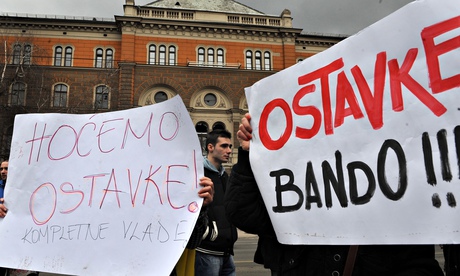Bosnia-Herzegovina fire feared to have destroyed Ottoman archives
Archive director Adamir Jerkovic condems blaze at state archives in Sarajevo as an "act of vandalism"

There have been large anti-government protests in Bosnia-Herzegovina. Photograph: Elvis Barukcic/AFP/Getty Images
Some of the most important historical documents charting the history of central Europe in the 20th century are feared lost, after a fire at the state archives of Bosnia-Herzegovina in Sarajevo.
The archive, which contains mostly documents from 1878 to 1918, when the Austro-Hungarian ministry of finance was in charge of Bosnia, but also older material from the Ottoman period and documents from the war crimes commission after the second world war, was targeted by protesters on Friday.
While staff have not been allowed to enter the building to assess the damage, historians are concerned that key documents have been lost in what archive director Adamir Jerkovic condemned as an act of vandalism.
News of the damage comes as central Europe prepares to commemorate the centenary of the start of the first world war. After the closure of the National Museum of Bosnia-Herzegovina in 2012 and the burning down of the National Library in 1992, there are fears that this region in Europe may be left without key empirical records of its own history.
There have been large anti-government protests in Bosnia-Herzegovina since the closure of a number of recently privatised state factories in the northern town of Tuzla last Wednesday. Protests soon spread to other towns, including Bihac, Mostar, Sarajevo and Zenica.
The archive, which contains mostly documents from 1878 to 1918, when the Austro-Hungarian ministry of finance was in charge of Bosnia, but also older material from the Ottoman period and documents from the war crimes commission after the second world war, was targeted by protesters on Friday.
While staff have not been allowed to enter the building to assess the damage, historians are concerned that key documents have been lost in what archive director Adamir Jerkovic condemned as an act of vandalism.
News of the damage comes as central Europe prepares to commemorate the centenary of the start of the first world war. After the closure of the National Museum of Bosnia-Herzegovina in 2012 and the burning down of the National Library in 1992, there are fears that this region in Europe may be left without key empirical records of its own history.
There have been large anti-government protests in Bosnia-Herzegovina since the closure of a number of recently privatised state factories in the northern town of Tuzla last Wednesday. Protests soon spread to other towns, including Bihac, Mostar, Sarajevo and Zenica.
No comments:
Post a Comment